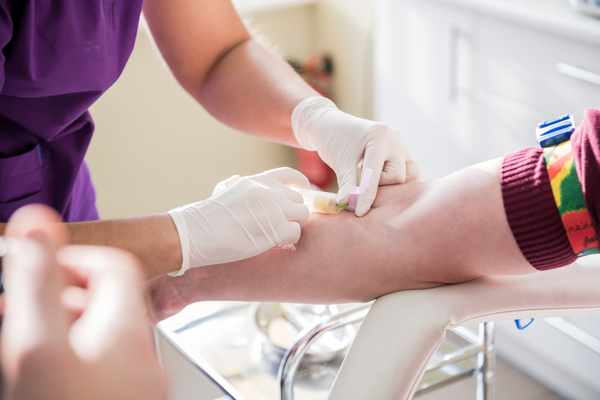A blood test intended to detect colorectal cancer performed well in a clinical study, a step towards expanding options for screening and early detection of the potentially deadly disease.
As CBS News reports, the study, published in the New England Journal of Medicine last week, found that the test correctly detected colorectal cancer in 83% of people confirmed to have the disease who were at average risk and not experiencing symptoms. For 10% of people, it falsely indicated they might have colon cancer when a colonoscopy found nothing.
“The results of the study are a promising step toward developing more convenient tools to detect colorectal cancer early while it is more easily treated,” corresponding author Dr. William M. Grady, a gastroenterologist at Fred Hutchinson Cancer Center, said in a news release. “The test, which has an accuracy rate for colon cancer detection similar to stool tests used for early detection of cancer, could offer an alternative for patients who may otherwise decline current screening options.”
CBS News chief medical correspondent Dr. Jon LaPook, a gastroenterologist at NYU Langone Health, said this promises to help usher in an alternative to current screening tests, including colonoscopy, stool testing for blood and stool testing for genetic material.
“A blood test is attractive because it’s relatively easy to do and there’s no ‘ick factor’ that can keep people from doing home stool testing,” he said. “In the New England Journal study, the cell-free DNA blood test detected 83% of colon cancers but only 65% (11 of 17) of those in stage 1, which are statistically the most curable, and I await further research to help determine its role in colon cancer screening.”
The test has not yet been approved by the Food and Drug Administration (FDA) and most insurers do not cover it, but it is already for sale in the U.S. for $895. “The company has made an FDA submission,” LaPook noted during an appearance on “CBS Mornings” on March 15. “The FDA is considering it, and they’re thinking in the spring there’s going to be an advisory committee and then it could be approved by the end of the year — remains to be seen.”
The findings come from a multisite clinical trial of nearly 8,000 people ages 45 to 84, where Guardant’s Shield blood test was compared to colonoscopy, the current gold standard for colorectal cancer screening. The study was led and funded by the maker of the test, Guardant Health. “The gold standard for colon cancer screening is colonoscopy because it can detect colon cancer in its earliest, most treatable stages and it can find and remove precancerous polyps before they have a chance to turn into cancer,” LaPook said.
While the blood test is a “potentially a big deal,” LaPook says, more details are needed.
While colorectal cancer is common and preventable with screening, only about 50% to 60% of people who are eligible for screening actually take those tests, Grady said. “Getting people to be screened for cancer works best when we offer them screening options and then let them choose what works best for them” he said.
The study comes as more Americans are getting colon cancer, and at younger ages. Colorectal cancer, once the fourth-leading cause of cancer deaths for people younger than 50, has leaped up the list, becoming the leading cause for men and ranking second for women, according to a study published earlier this year.
Colon cancer screening guidelines have shifted in recent years to try to catch cancer earlier, lowering the recommended age of first screening from 50 to 45 for adults with average risk. Overall, colorectal cancer is the third most common cancer diagnosed in both men and women in the United States, according to the American Cancer Society. The organization anticipates 106,590 new cases of colon cancer in 2024.
—
Photo Credit: Roman Zaiets / Shutterstock.com
